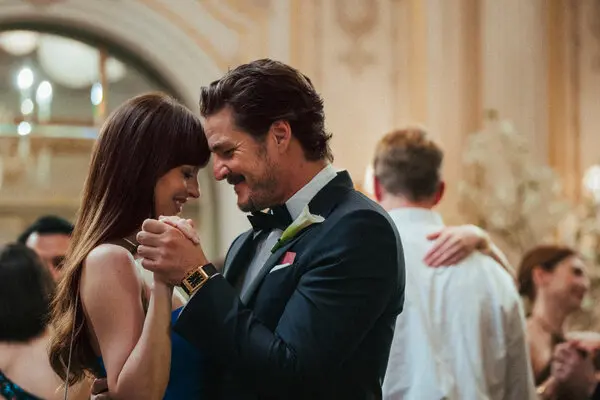
If you’ve spent even two seconds on social media, you’ve been made aware that modern day struggles with the dating scene are top of mind for countless people. Debates over who pays, which sex brings what to the table, how tall is tall enough, how much money is rich enough, inundate conversations within the zeitgeist. The dating app-lification of finding love has made connection feel like online shopping. But in the end, is that what really matters in finding the one for you.
Director Celine Song returns to theaters fresh off the success of 2023’s Past Lives with the similarly tender Materialists, a film that takes a more sentimental lens to the now cynical world of dating. It features Lucy (Dakota Johnson), a professional matchmaker who’s all business until her personal life takes a surprising turn — if more to her than to you — when she’s swept into a romance with two different men. One is a broke dreamboat John (Chris Evans), the other is more of a superyacht Harry (Pedro Pascal).
Materialists utilizes Lucy’s professional background as a conduit to take a peek inside the world of modern dating and ask questions that result from what we see. Namely, the film asks what it is that we value in love, superficiality and materialism versus connection, and how each ultimately serves us. A frequent refrain from Lucy and Harry, the two characters for whom superficiality forms the basis of their love strategy, is the marriage and love are a business which include mathematical calculations, tradeoffs, and the unfeeling, laser focused strategy that comes with succeeding in a deal between two parties. If it all sounds cynical and cold, as the story unfolds, we find out it’s because each character does have a bit of coldness at their core of the worldview, spurred by painful experiences of course and in Lucy‘s case, the formulaic, strategic, and calculating nature of her job bleeding over into her personal life.
The inherent coldness of this embittered tact toward relationships is juxtaposed by the magnetic, hard to conceal emotionality that Lucy and John display each time they encounter each other, the first time onscreen being a wonderfully executed introduction to John by Song where he interrupts Lucy and Harry’s first conversation. Lucy and John have an attraction built upon magnetism and longing, something pure that persists despite John’s financial struggles, Lucy‘s financial desires, and their knowledge that the conflict betwixt the two resulted in their implosion of their relationship all those years ago. It hearkens back to the film’s opening scene which depicts a pair of hunter-gatherers who get “married” with nothing but a ring made of a flower and their tools. A pure connection that exists because of their love for one another during a time when there were no material trinkets to have and all that mattered was having the person you felt for.
It’s a lesson the characters experience and one Song uses communicates to the audience using their story. The superficiality of the main characters and Lucy’s clients leads to unfulfillment, pain, and an inability to find what they’re looking for. Love isn’t a series of boxes that are checked off and then exchanged for like a good or service. To connect with another human being is to embark upon hardship inevitably, but doing so anyway because your care for them is so deep. Song depicts it as a feeling that defies logical sense and perfection like a mutually beneficial business deal or car purchase.
She’s aided by the actors in the film who portray people in various stages of dating with realistic accuracy, from Johnson’s depiction of Lucy’s jadedness and avoidance of what she lusts after versus her true feelings for John, to Harry’s formulaic analysis of “love” hiding his fear of its genuineness, to John’s hopeless romanticism to her client Sophia’s desperation. Sophia, played affectingly by Zoë Winters, is a lynchpin in Lucy’s emotionally journey and Winters handles her pivotal moments in a perfectly complimentary way. Each character represents a stage of searching for love that is sure to land with audience members’ experiences, allowing the film to connect empathetically.
At one point, as they contemplate their future, John tells Lucy that he knows what she’s like already and Lucy asks in return “Then how can you love me?” It’s this eternal question that sits at the center of every person’s hesitancy to love, to make themselves completely vulnerable toward a partner, and to approach finding that special someone as a calculated transaction rather than an exercise in trust and emotionality. Materialists holds a mirror to our modern hangups surrounding love and obsession with things and asks viewers to consider what is important and what isn’t. A quality cast aides her examination, culminating in a tender and thoughtful look at love, its costs, and its payoffs. While the ending does venture a bit toward cliche, Materialists is still an enjoyable film that speaks to our moment and culture at the same time.
Image: A24

